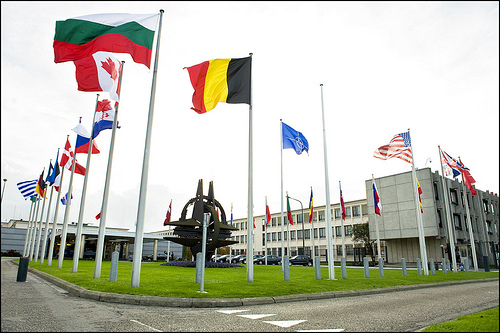Former U.S. Ambassador J.D. Bindenagel outlines the top 3 issues on NATO summit agenda
By Katie O'Brien

Former U.S. Ambassador J.D. Bindenagel outlines the top 3 issues on NATO summit agenda
By Katie O'Brien
Thousands of eyes will be on the city of Chicago this weekend as visitors from around the globe gather for the NATO summit—but few people will get an inside look at the actual meetings. Former U.S. Ambassador J.D. Bindenagel has been behind the scenes at several NATO summits over the years. And he says that while protesters absolutely help to shape the larger public discussions in the media, they will not impact what’s happening around the summit table.
This summit, Bindenagel says, is about deliverables—how will the allies implement and execute the strategic concept outlined at the 2010 summit in Lisbon? The strategic concept very clearly outlines NATO’s values and strategic objectives for the next decade. It very clearly identifies the alliance’s essential core tasks as collective defense, crisis management and cooperative security so that the alliance is able to equip itself, both politically and militarily, in “today’s transformed security environment.” So this weekend is not about mission or strategy, it’s about applying the Lisbon plan to pressing global issues.
Afternoon Shift asked Ambassador Bindenagel to take us inside the summit—and to outline the top three items on the agenda.
Topping his list, and everyone else’s it seems, is the endgame in Afghanistan—the when and the how. There has been recent confusion surrounding the withdrawal. The alliance committed to maintaining reduced combat force on the ground until the end of 2014 in Lisbon. But Defense Secretary Leon Panetta surprised allies in February when he told reporters that the administration wanted to hand off the lead in combat operations to Afghan security forces by late next year. The change in tune raised more than a few friendly eyebrows, especially since the United States provides nearly 70 percent of the 130,000 NATO troops in Afghanistan.
Beyond the how and the when, Bindenagel says there are other questions the alliance will be asking themselves: “What’s next? Are we actually going to be there for stability and reconstruction? What countries will participate?” Bindenagel said.
Second on his list is Smart Defense. NATO’s spending strategy is all about building security for less money by working together and being more flexible. But the austerity debate is ramping up in Europe; meaning growth is henceforth reduced and defense budgets are squeezed, which some fear may lead to the demilitarization of Europe—something Sec. Gates has warned against. And the U.S. definitely does not want to be left with the check at this particular table: Our country spends more than 4 percent of its GDP on defense; the average amongst European countries is just 1.6 percent.
I was having a bit of trouble understanding “Smart Defense.” Ambassador Bindenagel told me I wasn’t the only one and suggested I check out a recent episode of The Daily Show, featuring his friend and the U.S. Ambassador to NATO, Ivo Daalder. Host John Stewart asked the ambassador how the Smart Defense initiative contrasted to the other defense initiatives we’ve used in the past that “we didn’t think to name as ‘smart.’”
| The Daily Show with Jon Stewart | Mon - Thurs 11p / 10c | |||
| Ivo Daalder | ||||
| ||||
The third and broadest item on the list has to do with building global partnerships. What role can and should the alliance play in global crisis? Does its commitment to humanitarian efforts supersede its original purview?
To expand on the final point, Afternoon Shift host Steve Edwards brought Jobi Cates, director of the Chicago and Midwest office of Human Rights Watch, into the discussion.
